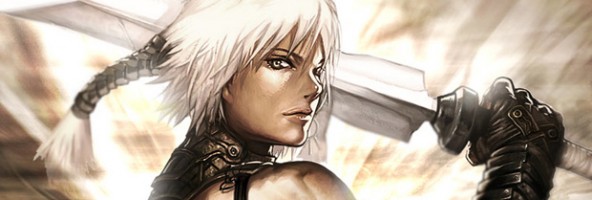Do You Own Your Virtual Items in an MMO Game?
In much the same way that you have a computer, clothing, a backpack, and a bed, your characters in games also have equipment, money, and items - however, while you can call your computer your possession, can you say the same for the magic items in your character’s backpack? After all, your computer is a physical object that can be packed up and traded, but your sword is just a row of data in a database that’s rendered into pixels with a model and a texture.
We may accept that virtual items are not entirely like real items, but when we lose them the loss can be profound. As players we spend our own time and money to obtain them for our characters either through ceaseless grinding or we purchase them from the game in question with real money. Getting hacked feels a lot like being robbed: having all of your epic level gear melted down into gold at a vendor, leaving your character naked and penniless - has an impact because you put real hours of game play and effort into getting those items. Being banned is a lot like exile: your investment is still there, but now the fruit of that labor is inaccessible, all at the whim of the game’s administrators.
There are a lot of reasons to feel as if players should have some say in the disposition of our virtual items and there is dissonance between the sentiment that players place on their items and characters and the current state of the law. The dissonance arises from the fact that virtual items only exist in the context of the MMO in which they’re generated: you can’t take your Gran Faust sword out of Spiral Knights and equip it on your warrior in Runes of Magic. No matter how much time, energy, or money you spent on obtaining raw materials and crafting weapons in-game, all of those virtual items will forever be tied to that game, to that publisher, and potentially to the character who equipped them.
Under much current international law virtual items in video games are not property but part of a license. The MMO publisher grants you a temporary service that includes your possession of the virtual items on your character’s person. The Terms of Service you accept when you join the video game spell out that you’re accessing their service and that they can pull the rug out from under you at any time for any reason. And when an MMO goes offline permanently (like Faxion Online, Fantasy Earth Zero, Exteel, among others) many virtual items evanesce out of existence. Your possession of virtual items is contingent entirely on the MMO publisher maintaining the servers that the data is stored on. In this way, the MMO company provides the items on a property-as-a-service basis to the players who possess them. The closest analog to game items are other types of services that are essentially “virtual” but hold value, such as bank accounts or stocks.
However, in each of these instances we contract with an institution to store a virtual representation of real world value - that is, the bank and you agree that the number in your bank account represents real money. In the case of a character or a virtual item there’s no such agreement for the traditional MMO player. For us, the very existence of the items and their ownership is part of the Terms of Service. Under the current laws and standard TOS, we do not own virtual items in the same fashion that we own real property; but, like most virtual things, our possessions in MMO games exist as part of a social contract between us players and the game publisher. Unlike standalone video games, MMO games build communities and it’s from this effect we see that virtual items gain a great deal of their affecting worth.
Because of the mutual interdependence of this social contract, we can argue that MMO game publishers and admins have moral responsibility to players and our virtual possessions. Good MMO publishers and administrators will respect that social contract - and thus the effort and commitment of the players - and players and publishers shall “share” (even if it’s unofficial, ephemeral, and temporary sharing) in the “custodianship” of that virtual property.
By Kyt Dotson
Read Next

Pay-to-play subscription-based MMOs have been around for a very long time now.
You May Enjoy

Participation will also earn players rewards built around the renewed Rune Mage class.

The update also introduces fashion templates, a quickplay mode for raids, and more.

How could Marvel Rivals improve the game in 2026? Here is a look at some of the most popular ideas.

The first stream of the year details new mini-episodes, exploration quests, and more.


But what exactly makes the difference between you losing virtual possesions or real possesions aside from being able to touch them? They are even translatable to real currencies.
You always agree with the terms of service that you don't mind being ripped off your account and possesions duo to any reason the company chooses to. And what exactly keeps a company from abusing that kind of power over your virtual life? They can basically do whatever they want as long as they keep it secret to not lose their playerbase, cause that's what you agreed to when you signed up for the game.
I remember the days when you could sell your high level Everquest on eBay for hundreds or thousands of US dollars. Does that still happen?
Now my Steam profile worth is 20$
this is why it's always better to play free to play games because no matter how much work and time you spend in a game your not investing real money and don't lose anything if the game is no longer able to be played.
The benefit to the later, of course, is that the money you keep channeling into the game goes toward expansions, updates, customer service, and if you have a lot of discretionary funds, premium items. The obvious disadvantage, of course, is that when it goes down you just have to bite the bullet, say goodbye to your investment, and try to be grateful for the fun you had but which has decidedly ended.
I used to play WoW but wasn't a hardcore-enough gamer to access the high-level realms and elite instances that I was nevertheless paying for. Eventually I cut myself off and pursued the free MMOs that rely on ads or users who are freer with their wallets for 1337 in-game items. While this article satisfactorily addresses many interesting points in the discussion of intellectual/virtual property, I'd laugh in the face of someone who shelled out for a sword and got pissy about it not being transferrable between platforms or lost it when the game collapsed. It's naive to throw your money at such a fragile, uncertain investment and get upset when it goes away.
But yeah, hacking is another issue entirely. That is something to get mad about.
I have never viewed it as having legal ownership of virtual items I buy, but in essence they are still mine. True the TOS's are totaly bull and i'm not entirely sure they are fully legally legitimate siteing the "for any reason" clause. Most MMO players never face that and when people get banned its never cause staff had a bad day.
Hacking is a seperate issue cause usually its peoples own fault but usually games will release some kind of compensation whice might not be what you want but its enough. Of course its different between f2p and p2p.
never thought it was my property